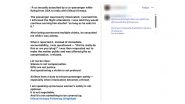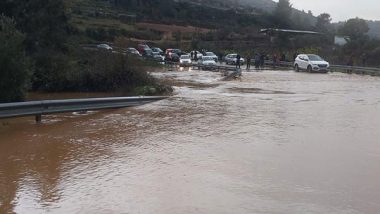Tel Aviv, June 7: The Hebrew University of Jerusalem researchers have identified factors influencing the likelihood of extreme rain events and have developed a tool that can improve the forecasting of such events.
Extreme rain events, particularly those that cause flash floods in the south and east of Israel in spring and fall are particularly difficult to forecast even a short while in advance. In April 2018, a flash flood killed 10 students from an army preparatory program who were hiking in Nahal Tzafit, a riverbed in the Judean Desert near the Dead Sea. Israel Launches First Tourist Marine Nature Reserve in Mediterranean Sea off Country's Northern Coast.
The research led by Dr Assaf Hochman and by doctoral student Tair Plotnik at the Institute of Earth Sciences at the Hebrew University determined the factors that impact scientists' ability to predict extreme rain events, which are linked to what is known as an "active" Red Sea Trough. Israel Launches First Tourist Marine Nature Reserve in Mediterranean Sea off Country’s Northern Coast.
The research team used an extensive database belonging to the European Center for Medium-Range Weather Forecasts to examine all extreme rain events since 1979 and to sort them into hard-to-forecast and easy-to-forecast categories.
They found that one of the factors preventing optimal forecasting is the simultaneous entry into Israel of air masses from the south and from the north, due to the significantly different characteristics of each.
A mathematical tool developed by the research team can improve forecasting even in difficult cases, so that in the near future it will be possible to predict the extremity of rain events in Israel with a high degree of accuracy, and subsequently also in other parts of the world.
This capability will enable decision-makers to prepare for such events, thus saving lives as well as significantly reducing associated damages.
"The study, and the tool we subsequently developed, allow us to examine the factors that create extreme rain and thus to forecast the conditions in which extreme rain events will develop. Using this kind of tool will likely save lives, as in the future it will allow the authorities to predict extreme rain events and to prepare for them properly," said Hochman.
"We plan to collaborate with the Israel Meteorological Service and other large forecasting institutions around the world in order to operationalize our unique new approach," he added.
(The above story is verified and authored by ANI staff, ANI is South Asia's leading multimedia news agency with over 100 bureaus in India, South Asia and across the globe. ANI brings the latest news on Politics and Current Affairs in India & around the World, Sports, Health, Fitness, Entertainment, & News. The views appearing in the above post do not reflect the opinions of LatestLY)













 Quickly
Quickly


